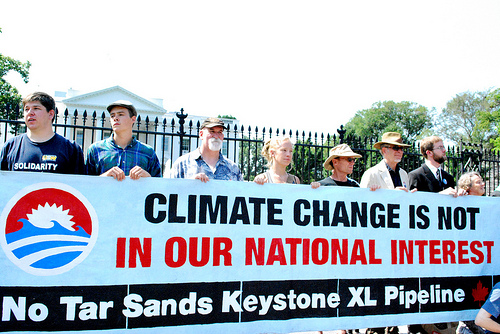The U.S. State Department has given the environmental thumbs-up to the Keystone XL pipeline expansion; from the province of Alberta, though the U.S. on its way down to the world’s largest refining hub on the Gulf Coast.
If completed, the pipeline will send 900,000 barrels a day of the world’s tar sands oil to U.S. refineries along the U.S. coast, thus allowing further development of the Alberta tar sands.
The $13-million TransCanada Corp. Pipeline project — which is the focus of ongoing mass demonstrations in Washington — is heralded in Canada and the U.S. as either a potential economic boon to the economy or an act of environmental genocide.
In the environmental impact study released Friday August 27, 2011, the U.S. State Department said TransCanada Corp. will need to conduct more environmental studies before the project can recieve final approval. The report concluded that the intensity of the tar sands’ emissions is only moderately worse than oil now being consumed in the United States.
Armed with this environment report, the U.S. State Department now has 90 days to make a “national interest” determination in which policy makers will have to examine the impact the pipeline could have on the environment, national security and the broader impact on the U.S. economy. It will also hold hearings in the states along the route of the pipeline. The pipeline would pass through the states of Montana, South Dakota, Nebraska, Kansas, Oklahoma, and Texas.
After the determination, President Obama will then decide later this year on TransCanada’s permit for the Keystone XL tar sands pipeline.
The tar sands impact has been termed by environmental and Indigenous rights activists as “slow industrial genocide.” Mining oil from tar sands creates three times more carbon emissions than conventional oil extraction.
According to Indigenous Enviromental Network, “The world is teetering on the brink of climate crisis. But attempts to avert it are being threatened by a massive industry in the Canadian wilderness. Major oil companies, banks and investors are pouring billions of dollars into the development of the Alberta Tar Sands.” You can read the full report here (pdf).
Hundreds have been arrested in Washington since mass protests began on August 20, 2011, including Canadian actors Margot Kidder and Tantoo Cardinal.
“It’s an honor to be here with so many people from across the U.S.,” said Tantoo Cardinal. Cardinal was born in the capital of the tar sands, Ft. McMurray, Alberta. “This is about protecting our land, our water, and our climate. The tar sands destruction has to stop.”
**
Ottawa demonstration on Monday Sept. 26, 2011 — you can read the call out here.
Contact list for tar sands actions and other solidarity actions:
Tar Sands Action — [email protected]
Canada — [email protected]
Europe — [email protected]
Australia and New Zealand — [email protected]
**
Awesome Canadian Indigenous about the tar sands and other environmental justice causes from an Indigenous perspective: The Indigenous Environmental Network
Toronto Contact group for environmental justice activists interested in anti-tar solidarity work, please contact Environmental Justice Toronto at [email protected] or check out their website here.
For more Canadian news, please check out Environmental Defence.



